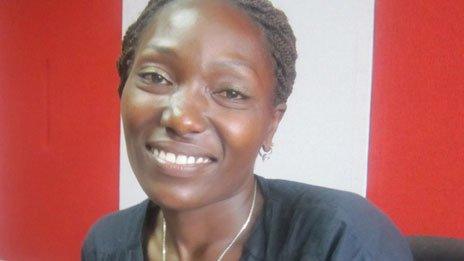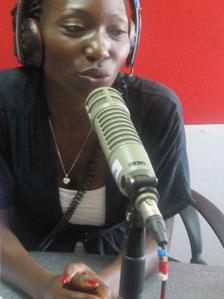Abortion case study: ‘There was no anaesthetic’
- Published

Akech Ayimba after her unsafe abortions now has a pro-life position
Akech Ayimba has had two abortions in Kenya, where until recently the procedure was illegal.
According to a World Health Organization study, external, in Africa almost 97% of abortions are unsafe, putting women's health at risk.
It said developing countries, particularly those with more restrictive abortion laws, had the most cases of unsafe abortions.
Ms Ayimba told the BBC's Focus on Africa programme about her experiences and her work with women who seek counselling after having abortions.
Testimony:
I went through an unsafe abortion when I was about 20 years old.
I was afraid to go and tell my mother that I was pregnant. I was four months pregnant and decided to face her but on my way home I met a close family friend.
He said, "If you tell your mother you're pregnant, you're going to break her heart."
He said there was another option, another way out. I was very scared because I didn't know anything about abortion but he told me it was going to be OK and safe.
He looked for the money, because I didn't have any at that time, and paid a nurse who took me to a gynaecologist in Kisumu, and that's where the abortion was performed.
I was not put under any anaesthetic and on the abortion bed it was such a very painful experience - though it took place in a clinic.
Suicidal
The Guttmacher Institute's Gilda Sedgh on the WHO study into abortion
After that I was given an injection and I slept for a while and then got up and went home. My life went back to normal but every once in a while I would have pains in my stomach. It would make me jerk with the pain - for more than a year.
The pains kept coming. At this time psychologically I felt I was not good enough for another man - in my mind I was thinking no man would want to marry a woman who has gone through an abortion.
So when I got into another relationship, it was with low self-esteem, looking for love and acceptance.
After that, I got pregnant again - I was a very naive person and did not know much about protection - and the one I knew about, the condom, I didn't like.

Ms Ayimba runs support groups for those who suffer after abortions
Because the first abortion had solved my problem, I went through a second abortion. It was the easier option: I didn't think twice about it.
I was able to do my exams, - at the college of my dreams. I didn't want my pregnancy to stop my career.
But after a few months of relief, I then went through a lot of psychological trauma - I was a very, very depressed person.
I would hit depression about two times in a month: I would really hate myself - I couldn't look myself in the mirror because I knew in my heart what I'd done was so wrong.
I was also very suicidal. In fact, twice I attempted suicide.
I was angry with myself, angry with the world, there was anger against the people who took you for the abortion.
There was bitterness and regret because when you're seeing other people's children, in your mind you're visualising how old your baby would have been and you really feel bad about it.
Pro-life
I have recovered because I have been through professional counselling.
I am now pro-life as a result of what I went through.
Kenya's constitution [adopted in 2010] now permits abortion if a woman is considered at risk, but the risk is debatable, allowing some to have abortions for reasons that are not medical.
I now counsel women who have had abortions. Many ladies who have come for the support groups have gone through the abortion knowing they want to solve the problem but later go through post-abortion syndrome and many complications that come after.
I once had a lady who went for an abortion in a proper clinic and after the procedure she thought that her womb was still there, only when she got married and tried to have babies she discovered she had no womb.
She traced back to the clinic and they told her: "Oh, there was a complication and we removed it, sorry we didn't tell you."
Another lady, two months after the abortion, she discovered that she had a spinal cord left in her womb.
The stories are so many - there are so many complications that come after an abortion, even if it's done in a proper clinic.
- Published9 December 2011